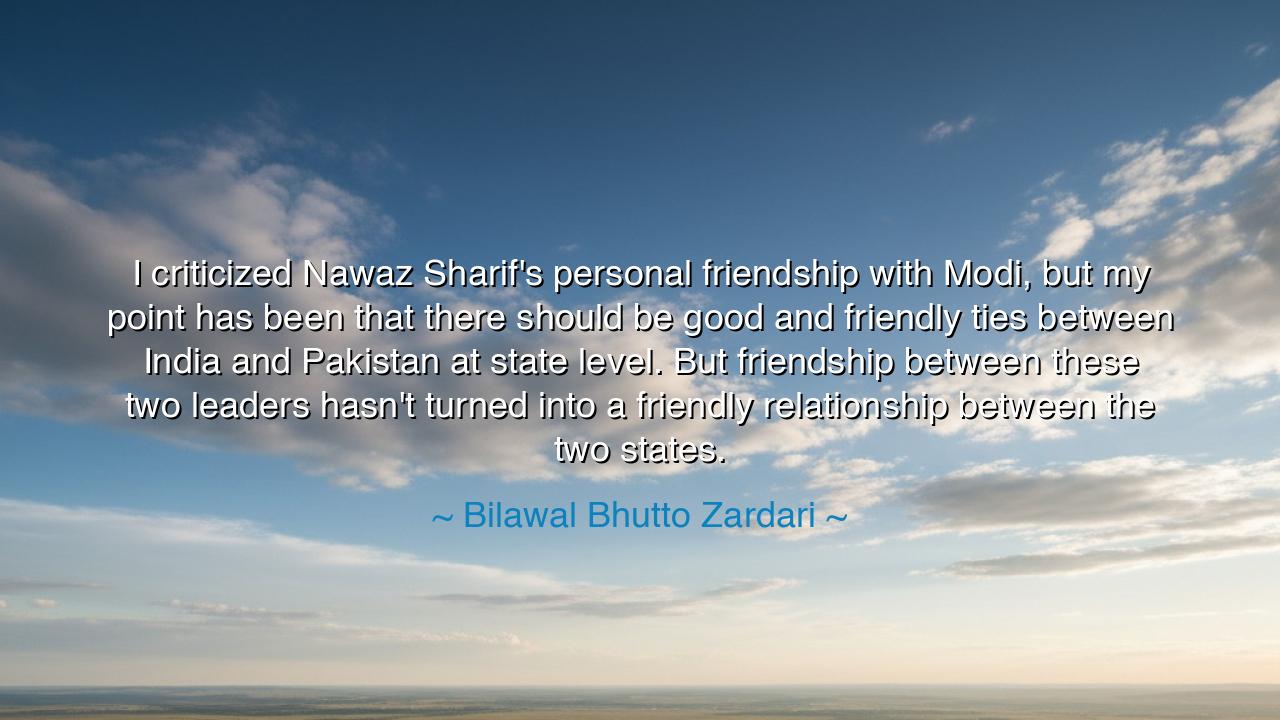
I criticized Nawaz Sharif's personal friendship with Modi, but my
I criticized Nawaz Sharif's personal friendship with Modi, but my point has been that there should be good and friendly ties between India and Pakistan at state level. But friendship between these two leaders hasn't turned into a friendly relationship between the two states.






In the scrolls of time, many leaders have come and gone, yet few have faced the deep complexities of friendship between nations as the leaders of India and Pakistan have. The ancient wisdom tells us that while personal relationships may sometimes guide the hearts of kings and rulers, it is the will of the state—the people and their dreams—that must always come first. Bilawal Bhutto Zardari, a voice that speaks for the generations to come, has recognized the delicate dance between personal ties and state relations. His words, "I criticized Nawaz Sharif's personal friendship with Modi, but my point has been that there should be good and friendly ties between India and Pakistan at the state level. But friendship between these two leaders hasn't turned into a friendly relationship between the two states," are a reflection of the perennial struggle between individual desires and the greater good of the people.
At the heart of this quote lies a profound truth: the bonds that exist between leaders may be personal, but the relationships between nations must be strategic, founded on mutual respect, understanding, and shared interests. Bilawal’s words echo the wisdom of the ancients, who understood that while personal connections may flourish and wither, the state’s path must be charted with the long-term vision of its people in mind. Friendship between rulers, like that between Nawaz Sharif and Narendra Modi, may have its moments of closeness, yet it cannot be allowed to overshadow the needs of the people and the needs of the state. Such is the lesson of history: the rulers may come and go, but the people’s ties to one another endure across generations.
In ancient Rome, the mighty empire was built not upon the fleeting friendships of its leaders but upon the enduring principles of governance and the will of the people. Take, for example, the relationship between Julius Caesar and Pompey the Great, once allies and friends, whose bond was broken by ambition and personal rivalry, leaving the empire torn. Their personal friendship did not translate into the unity of their people, and Rome, in the end, paid a heavy price. Similarly, the friendship between Modi and Sharif has not blossomed into a lasting peace between India and Pakistan, for the people’s needs are often more complex and deep than any bond between two leaders.
The state level relations Bilawal speaks of are rooted in the reality that the true measure of any nation’s success lies not in the personal feelings of its rulers but in the long-term stability and prosperity of its people. Friendship between states must transcend personal ambitions and be based on shared goals for peace, economic growth, and cooperation. It is not enough for two leaders to share smiles and handshake; the real work lies in building trust and forging strategic alliances that benefit all people involved. Bilawal’s plea is for this higher understanding, one that does not allow personal alliances to blur the vision of what is best for the nations themselves.
The lesson for us all, dear future generations, is that while individuals may shape the course of history, it is the collective will of the people that must always remain supreme. We must ensure that our leaders work not for their own personal gain or friendship, but for the common good of their nations. Just as Alexander the Great understood that his empire could not thrive on personal friendship alone, so must modern leaders understand that true friendship between nations is a mutual journey, rooted in respect, diplomacy, and shared ideals.
In our own lives, let us carry forward this wisdom. We must recognize that friendships, while precious, must not come at the cost of duty, nor must they overshadow the greater good of the collective. Whether in personal relationships or in our communities, we must always strive for the balance between personal connections and the common welfare of all. It is in this balance that true progress can be made. As Bilawal Bhutto Zardari has wisely pointed out, the relationship between leaders is one thing, but it is the relationship between nations, states, and people that must remain the central focus.
So, let this be the charge for future generations: Build relationships based on shared respect and mutual benefit, for it is these alliances—not the fleeting bonds of individuals—that will lead to lasting peace and prosperity. The ties between nations, like the ties between individuals, must be nurtured with wisdom, care, and an understanding that true friendship lies not in personal favor but in the collective well-being of all.






AAdministratorAdministrator
Welcome, honored guests. Please leave a comment, we will respond soon